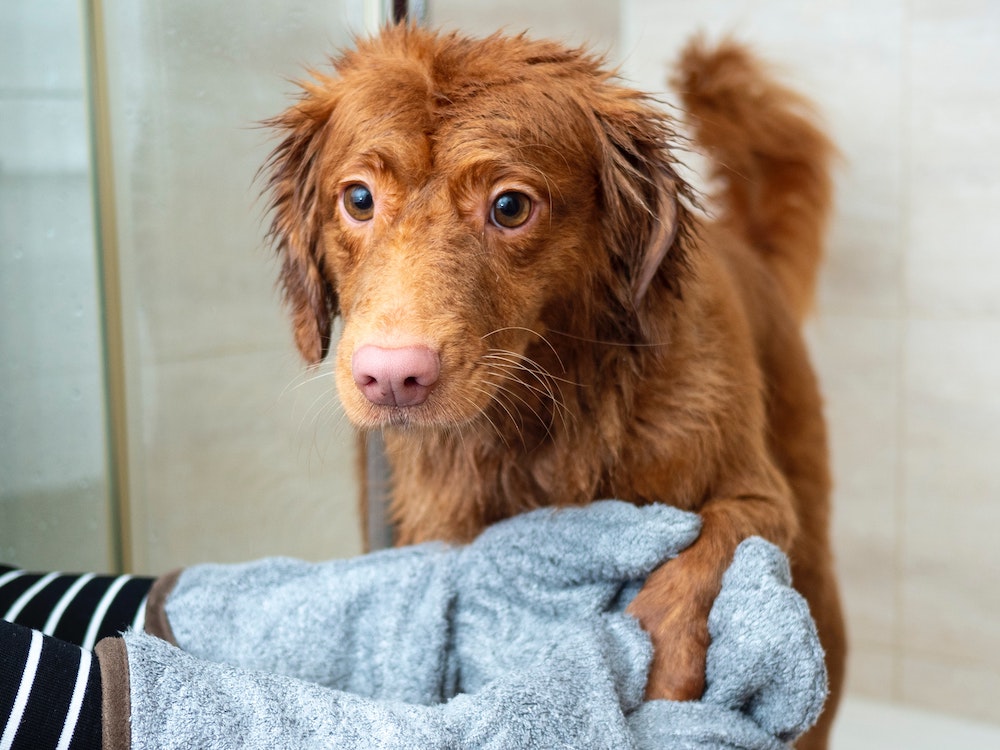
Keep you and your dog safe and happy during the cold and dark season
Does your dog love the winter or would they rather stay in doors and cuddle up on the couch or under a cosy blanket?
Either way, you should be prepared to protect them when they step out into the winter cold. To try and keep your dog safe and happy during the winter months we have devised a list of care tips to help you stay safe this season:
Walking in snow and ice
As much as our dogs love to play in the snow we often find that it sticks to fur and hair and with the mixture of grit/gravel and chemicals used by local councils to grit the roads this can often get stuck in their paws and cause discomfort. Not to mention the risk of poisoning if the dog then licks or chews their paws! One top tip is to always rinse their paws in lukewarm water after a snowy winter walk or when you know the local council or neighbours etc have been spreading rock salt or anti-freeze. This will remove any foreign objects in their paws and rinse away any nasty chemicals.
It is also worth checking on the condition of your dog’s paws as sometimes the salt and tough conditions can cause cracks. There are a few brands out on the market of dog paw wax that can help to keep your dog’s paws healthy.
Walking in the dark
Winter coats
Many dog owners live with the misconception that because their pets have a coat of fur, they can tolerate the cold better than humans. This isn’t necessarily the case. Like us, these fur-coated animals are used to the warmth of indoor shelter and cold weather can be as hard on them as it is on us humans.
There are lots of options available to keep your dog warm over the winter months and when venturing out on your walks – from pyjamas to jumpers to winter waterproof coats – we highly recommend you invest in a good quality coat which fits your dog like a glove. The brand/maker of your dog coats will be able to explain to you how to measure your dog correctly for size or indeed pop along and try the coats on in the shop.
Go outside when the sun shines
If your dog feels the cold, try to walk him/her in the late morning or early afternoon hours when temperatures are a little warmer, and avoid early morning or late evening walks.
Spend time playing outdoors while it’s sunny. Sunshine brings the added benefit of providing both you and your pet with vitamin D. Play fetch with toys, not sticks, which can cause choking and other injuries. So, if your dog likes to chew and chase, pack a Frisbee, ball or other safe toy and play together in the sun.
Cozy, dry, and comfortable bedding
Don’t let your dog sleep on a cold floor in winter or in any season. Choosing the right bedding is vital to ensure your dog stays warm. Warm blankets and bedding can create a snug and warm environment. Raised beds can keep your dog off cold tiles or concrete, and heated pet beds can help keep the stiffness out of ageing joints.
You could also add a hot water bottle to your dog’s bed at any point throughout the day but do ensure you supervise at all time and the hot water bottle is not directly in contact with your dog. Do remember to keep your dog’s bed away from doors and draughts, and place a rug or a mat underneath the bed for additional protection.

Keep your dog's skin well moisturised
Harsh winters and dry and cold weather can dry out your dog’s skin – the same way it does to humans. Prevent dry, flaky skin by adding a skin and coat supplement to your dog’s food.
Coconut oil, and natural oils from fish such as sardines, are a good natural moisturizer that can help keep your pet’s skin and coat healthy. If you find your pet’s paws, ears or tail are dry or cracking, you can also apply coconut oil topically as needed, or a dog based balm specifically for noses and paws. If you are walking on gritted roads and paths – be sure to wash the salt off your pet’s paws and add some balm to stop them from drying out too.
Keep your dog well groomed
Your dog needs a clean, well-groomed coat to keep them properly insulated. This is especially important if your dog spends a lot of time outdoors. After bathing, dry your dog thoroughly, especially before allowing her outside. If you have your dog groomed by a professional groomer make sure you keep to your recommended time between appointments and ask your groomer to ensure nails are clipped appropriately and teeth cleaned regularly.
If you don’t take your dog to a grooming salon, make sure you keep on top of your dog’s nails and teeth and always ask someone to help if you struggle to keep your pet calm and still during the procedures.

Watch where your dog plays
Special care for older dogs
Cold weather will often aggravate existing medical conditions in dogs, particularly arthritis. It’s very important to maintain an exercise regimen with your arthritic dog, but be mindful of slippery surfaces and make sure your dog has a warm soft rest area to recuperate after activity.
If you don’t already give your senior dog a natural joint supplement to lubricate the joints and ease the discomfort of arthritis, you may want to consider adding one to your dog’s diet. Ensure your senior dog is warm, comfortable and dry. It’s important to exercise little and often to keep your older dog mobile, however, if you do suffer from harsh weather during the winter season then be mindful of where you walk your senior dog, and ensure the terrain is safe and not slippy for them.
The winter months bring a wide variety of additional care tips and needs. Extremely cold, numbing rain or biting winds can cause discomfort for your dog so be sure to ensure you keep these winter care tips in mind and enjoy everything winter has to offer.

